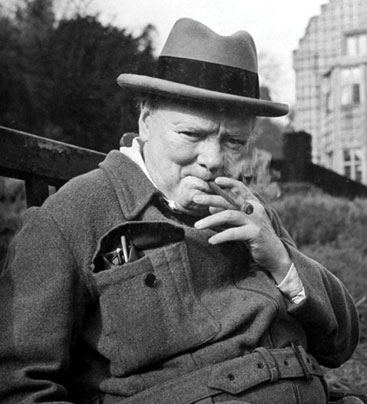CHURCHILL OUT OF HIBERNATION, WEEK 44
A HISTORY OF THE ENGLISH-SPEAKING PEOPLES was Winston Churchill’s final opus magnum. As history, it is flawed; as literature it is marvelously illuminating and entertaining. Just like the man himself. We explore it next, with the finish line in sight, on our marathon race through his book-length works.
 Almost immediately upon arriving at Chartwell after vacating Downing Street in April 1955, Winston Churchill picked up a 16-year-old manuscript, the first draft of which he had laid aside on the September night in 1939 when Britain had gone to war. He reconvened his research team (specifically his assistant, the lawyer Denis Kelly, and the historian Alan Hodge) and resumed work on A History of the English-Speaking Peoples.
Almost immediately upon arriving at Chartwell after vacating Downing Street in April 1955, Winston Churchill picked up a 16-year-old manuscript, the first draft of which he had laid aside on the September night in 1939 when Britain had gone to war. He reconvened his research team (specifically his assistant, the lawyer Denis Kelly, and the historian Alan Hodge) and resumed work on A History of the English-Speaking Peoples.
The idea for such a history had first occurred to Churchill in the early 1930s, as he flailed and flogged for publishable projects to keep himself financially afloat. It is apt that he would peg his theme to the English language he so venerated and ennobled in his own writings, and to the peoples who spoke it, rather than merely to Anglo-Saxon culture and its institutions. That the final work would prove to be a bit of both was also fitting. Churchill’s writing always followed where the fancies of his mind led. Or as Churchill’s old Labour colleague and predecessor as PM the second time around, Clement Atlee, remarked, a better title for A History of the English-Speaking Peoples might well have been: “Things in History Which Interested Me.”
Churchill originally envisioned a single volume work, when Cassell first handed him a £20,000 advance for it in 1932. The end result comprised four volumes, published over three years, from 1956-1958. British island history dominates, with the U.S. a distant second, and Britain’s Commonwealth English-speaking nations, Canada, Australia and New Zealand, virtually ignored. Volume I, The Birth of Britain, fascinatingly delineates England’s tribal origins, through the rule of Richard III. Volume II, The New World, triumphantly addresses Britain’s ascent to a global power and the incipient existence of its North American colony. Volume III, The Age of Revolution, embraces Churchill’s favorite touchstones of history: the adventures of his ancestor Lord Marlborough, America’s war of independence, and Napoleon’s rise and fall. Volume IV, The Great Democracies, covers most of the 19th Century before abruptly halting at the 20th. “I could not write about the woe and ruin of the terrible twentieth century,” Churchill explained sadly to his doctor, Lord Moran. One can only wonder what he might have written about our 21st.


